The BERA exam, also known as BAEP or Brainstem Auditory Evoked Potential, is an exam that evaluates the entire auditory system, checking for the presence of hearing loss, which can occur due to damage to the cochlea, auditory nerve or brainstem.
Although it can be performed on adults, the BERA exam is more frequently done on children and babies, especially when there is some risk of hearing loss due to genetic conditions or when there is an altered result in the ear test, which is a test carried out shortly after birth and which assesses the newborn’s hearing capacity. Understand how the ear test is performed and the results.
Furthermore, this test may also be requested in children who have a delay in language development, as this delay may be a sign of hearing problems. Learn how to identify if your baby doesn’t hear well.

What is the exam for?
The BERA exam is mainly indicated to evaluate the development and auditory response of children, premature newborns, autistic children or children with genetic alterations, such as Down Syndrome.
In addition, the exam can also be done to diagnose hearing loss in adults, investigate the cause of tinnitus, detect the presence of tumors involving the auditory nerves or to monitor hospitalized patients or those in a coma.
How the exam is carried out
The exam lasts between 30 and 40 minutes and is normally carried out while you sleep, as it is a very sensitive exam and, therefore, any movement can interfere with the results of the exam. If the child moves a lot during sleep, the doctor may recommend sedating the child for the duration of the exam, to ensure that there is no movement and that the result is not altered.
The exam consists of placing electrodes behind the ear and on the forehead, in addition to a headset that is responsible for producing sounds that will activate the brain stem and auditory nerves, generating spikes of electricity according to the intensity of the stimulus, which are captured by the electrode and interpreted by the doctor based on the sound waves recorded by the equipment.
The BERA exam does not require any type of special preparation and is a non-invasive procedure that does not cause any type of pain or discomfort.
We regularly update our content with the latest scientific information, so that it maintains an exceptional level of quality.
Bibliography
- SOUSA, Luiz Carlos; RODRIGUES, Luciano S.; PIZA, Marcelo R. et al. Occasional finding of neurological diseases during childhood deafness research through BERA. . . . Rev Otolaryngology Bras. Vol 73. 3 ed; 424–428,
- CURADO, Nathalia Raphaela PV; MUNIZ, Lilian F.; SILVEIRA, Ana Caroline et al. Bone conduction brainstem auditory evoked potential: an integrative review. Rev. CEFAC. Vol 17. 2 ed ; 635-647, 2015

Sign up for our newsletter and stay up to date with exclusive news
that can transform your routine!
Warning: Undefined array key "title" in /home/storelat/public_html/wp-content/plugins/link-whisper-premium/templates/frontend/related-posts.php on line 12
Warning: Undefined array key "title_tag" in /home/storelat/public_html/wp-content/plugins/link-whisper-premium/templates/frontend/related-posts.php on line 13



